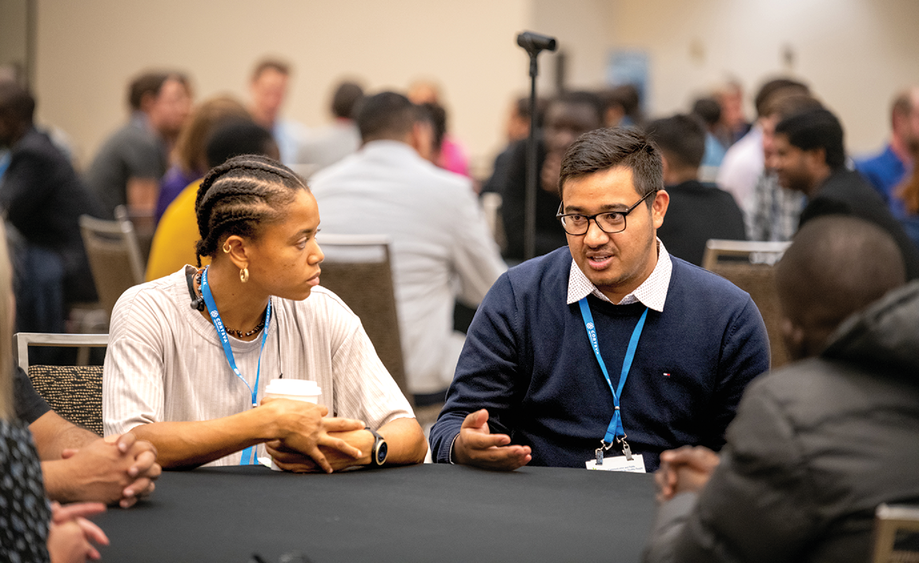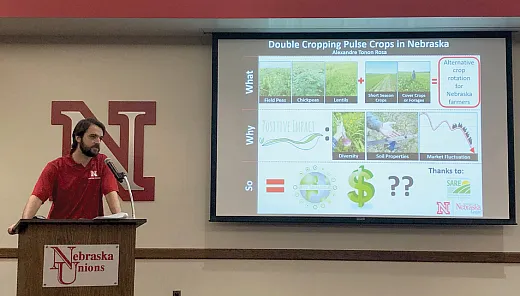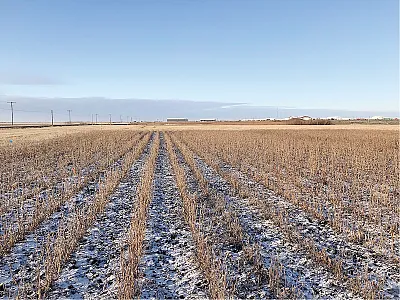Why Should You Think of Career Networking During Graduate School?

As science becomes increasingly more interdisciplinary and collaborative, it is unsurprising that graduate students are frequently reminded of the importance of networking. From lab and classmates that help with the day-to-day of graduate education to the professional contact that recommends an open job opportunity to co-authoring a publication with a contact you made at a conference, the opportunities that networking provides are almost too numerous to list. Closely associated with long-term career success, networking builds professional and personal contacts that can become crucial to our success, but how we develop our networks is up to us.
This article provides recommendations for identifying potential networking opportunities, creating your personal brand, building your networking circle, maintaining and developing your network's connections, and taking advantage of opportunities within the Societies for networking.
Identifying Your Network and Finding Opportunities
Considering the critical role that our networks have on career opportunities and success, networking can seem like a daunting and challenging endeavor. However, networking is simply paying attention to the people around you, interacting with others when networking opportunities appear, and seeking opportunities to meet and interact with others. We recommend first assessing your current network and then identifying how you would like to grow and develop your network by identifying your career goals, interests, and needs.
Graduate school sets the foundation of your future network through the extensive amount of people you work with and alongside during the earliest years of your career. Your adviser, committee, current and former students in your lab, other graduate students in your department and classes, and other people you interact with for work are part of your graduate school network. Developing and maintaining these relationships is essential to establishing them within your network. We will discuss methods of developing and maintaining these relationships later. However, we want to emphasize how important it is to identify who your current network is and work to develop these relationships.
This current network also provides the necessary experience for practicing your networking skills and is generally easier to develop due to the opportunity for interaction and collaboration that its proximity provides.
Once you have identified your current network, we recommend that you identify how you would like to grow and develop your network by assessing your career goals, interests, and needs. Knowing where you would like to grow your network and whom you would like to have within it allows you to seek out networking opportunities with targeted outcomes. For example, if you are interested in a strong involvement with outreach and education in your future career, getting in contact with groups on campus or organizations within your state that focus on outreach and science education will help you build your network with this in mind. Identifying your career goals, interests, and needs is also helpful for identifying and participating in broader networking opportunities. As an example, most graduate students are familiar with our research conferences, which provide the opportunity to meet national and international scientific, professional, and governmental experts from a wide array of different careers with a general focus on a given discipline or scientific focus. National and international academic and professional societies also provide extensive opportunities for networking through involvement with their organizations or attendance at their meetings and events. While these broad networking opportunities can be intimidating in their size and scope, networking within them is as straightforward as developing and maintaining your current network.
Recommendations for Developing and Maintaining Your Network
Your network is your net worth. According to the network sciences, the number one predictor of career success is the size and openness of your network. Simply put, evidence of high work performance and thought metrics, such as compensation, evaluation, and promotion, usually occurs in large and open networks where you are the link between groups of people. The network is also one of the critical catalysts for stimulating innovation in the workplace, which is an important and needed aspect in inter- and transdisciplinary research. As graduate education offers several opportunities to enlarge our network, here are a few important considerations:
Personal Branding
Tell your story—this is one of the most effective personal branding strategies to engage with your network. One way to tell your story is through written content, images, and videos available on a personal website, including resume websites, portfolios, blogs, and demo websites. Consider these options as your digital business card, a way to highlight your accomplishments, work experiences, and publications, and even to include your presentation references and additional information through unlisted pages and QR codes.
As you garner a reputation of being an expert in your research field, consider amplifying this using online platforms. One example is engaging with your network more meaningfully on social media platforms such as Twitter and LinkedIn. For additional strategies on building an online presence through social media, consider revisiting the recently published article (https://doi.org/10.1002/csan.20515) by Pires and Krupek (2021) and watching the webinar series (crops.org/gradstudents/webinars/) led by the ASA, CSSA, and SSSA Graduate Student Committee.

Elevator Pitch
Usually, we only have under two minutes to make an impression. Those seconds are often referred to as your "elevator pitch," a brief statement (three to four sentences) of who you are and what your research impact is. When crafting your elevator pitch, consider checking out this article (https://bit.ly/3DGLEy6) by Schmer (2012) on elevating your elevator talk. Building your network also means that it is not enough to network within academia or groups of people within your immediate sphere of influence—you must branch out. Meet with people outside of academic settings,
and get comfortable interacting with a diverse group of stakeholders representing industry, government, and non-profit organizations. For example, the Networking Session and lots of other programming held yearly as part of the ASA, CSSA, and SSSA Annual Meeting are a golden opportunity to practice and hone your elevator pitch by introducing yourself to a diverse pool of potential employees or collaborators.
In the same way many of us are driven to keep our personal relationships healthy and lasting over time, professional networks should be considered part of our frequent and active efforts.
Maintaining and Nurturing Relationships
In the same way many of us are driven to keep our personal relationships healthy and lasting over time, professional networks should be considered part of our frequent and active efforts. Once a networking connection has been made, follow-up is critically important. It is a good idea to connect with new people you meet within a week or two of your first meeting; however, if more time has passed, feel free to start an email thread. The worst thing that might happen is that your contact needs to respond, so make an effort. If a more significant amount of time has elapsed, include more details regarding when you met, the nature of the initial conversation, and some pertinent information about yourself (university, research interests, and career goals). Today follow-ups are generally over email and may be as formal or informal as you feel the connection is. For example, a potential doctoral adviser warrants a formal email, whereas an email to a fellow graduate student may be less formal. Depending on the industry, there are times when you may be asked to connect over another communications channel, such as LinkedIn or via phone. In the case of social media, make sure your profile information is updated and professionally composed.
Once new networking connections have been made, you may lead the group's charge. Consider this before you conduct your follow-up. As graduate students, we are busy with classes, research, and service. Feel free to make new connections and surface ideas for collaboration. Be honest about availability and new projects, and discuss any proposals with your adviser first. Beyond the business aspect of networks and new connections, it is important to remember that you are, first and foremost, cultivating relationships. If you are the leader of the connection, be sure to maintain the relationship like other relationships with emails to check in on how everyone is doing, offer brief life updates, or share good news from your lab. Networking and connections are not only crucial for your current and future career, but they can be good for your mental health too (Fernandez et al., 2019). With all networking and collaboration efforts, be sure to keep yourself organized. The skills you have learned in balancing your graduate work can be utilized in much the same way to keep your discussions on
track.
Opportunities to Develop a Networking Circle

We have shared some insights about identifying, developing, and maintaining your network during grad school. Here are some quick tips for summarizing how you can excel in building an effective network "circle":
- Networking starts from your primary lab/institution/class. Do not hesitate to talk to your supervisor/labmate/classmate to introduce you to someone who would like to get connected.
- Invest some time in making a personal website or blog post to share your story.
Do not underestimate the power of professional platforms like LinkedIn and Twitter. Keep your profiles updated, and actively share your experiences, stories, or relevant information. - Get two minutes of someone's attention and make a memorable professional impression. Always follow up—it is crucial. Usually, connections are made and lost because of no effort in their maintenance.
- Networking is not a box to check off. Allow some time to develop your professional relationships.
References
Fernandez, M., Sturts, J., Duffy, L. N., Larson, L.R., Gray, J., & Powell, G.M. (2019). Surviving and thriving in graduate school. SCHOLE: A Journal of Leisure Studies and Recreation Education, 34(1), 3–15. https://doi.org/10.1080/1937156X.2019.1589791
Pires, C.B., & Krupek, F.S. (2021). Building your online presence through social media during grad school. CSA News, 68(7), 44–48. https://doi.org/10.1002/csan.20515
Schmer, M. (2012). Elevating your elevator talk. CSA News, 57(6), 38. https://bit.ly/3DGLEy6
Connect With Us
If you would like to stay up to date with our the ASA, CSSA, and SSSA (ACS) Graduate Student Committee, learn more about our work, contribute to one of our CSA News magazine articles, or suggest activities you would like us to promote, watch your emails, connect with us on Twitter (@ACSGradStudents) and Facebook (ACS.gradstudents), or visit
- ASA: agronomy.org/membership/committees/view/ACS238/members/
- CSSA - crops.org/membership/committees/view/ACS238/members/
- SSSA - soils.org/membership/committees/view/ACS238/members/
You can also email Maria Teresa Tancredi (2023 Chair for the ACS Graduate Student Committee): mariateresa.tancredi@uga.edu.
Text © . The authors. CC BY-NC-ND 4.0. Except where otherwise noted, images are subject to copyright. Any reuse without express permission from the copyright owner is prohibited.











